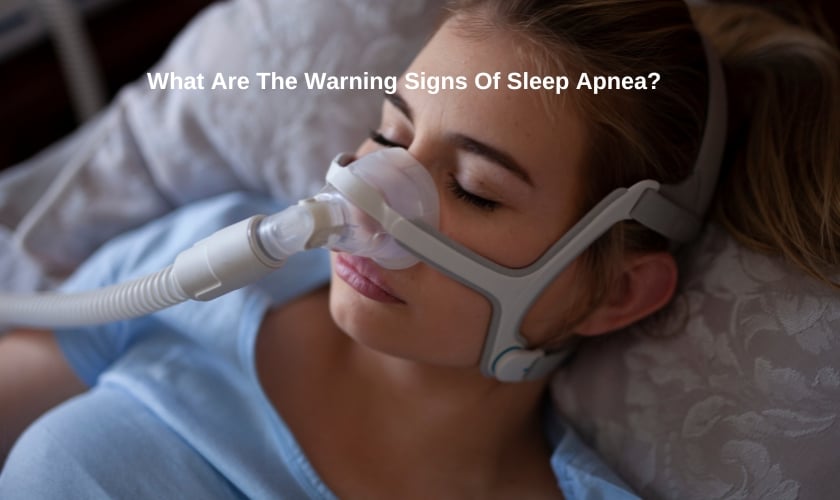
Sleep apnea is a common but potentially serious sleep disorder that affects millions of people worldwide. Characterized by pauses in breathing or shallow breathing during sleep, sleep apnea can have a significant impact on an individual’s overall health and quality of life if left untreated. Recognizing the warning signs and symptoms of sleep apnea is crucial for timely diagnosis and management.
This article provides an overview of sleep apnea, explores the common warning signs and symptoms, discusses risk factors for developing the condition, highlights the consequences of untreated sleep apnea, and outlines diagnostic methods, treatment options, lifestyle changes, and the importance of seeking medical advice for those affected by this sleep disorder.
Overview of Sleep Apnea
Sleep apnea is a common sleep disorder characterized by pauses in breathing during sleep. There are two main types: obstructive sleep apnea, where the throat muscles relax and block the airway, and central sleep apnea, where the brain fails to signal the muscles to breathe.
Definition & Types
Sleep apnea is a sleep disorder in which breathing repeatedly stops and starts. Obstructive sleep apnea is the most common type, caused by the relaxation of throat muscles, while central sleep apnea is due to a lack of respiratory effort from the brain.
Prevalence in the Population
Sleep apnea is more common than you might think, affecting millions of people worldwide. It is estimated that up to 20% of adults have some form of sleep apnea, with obstructive sleep apnea being the most prevalent type.
Common Symptoms & Warning Signs
Identifying the warning signs of sleep apnea can lead to timely diagnosis and treatment. Keep an eye out for these common symptoms that may indicate you have sleep apnea.
- Snoring: Loud and chronic snoring is a hallmark symptom of sleep apnea, especially if it is accompanied by pauses in breathing or gasping for air during sleep.
- Excessive Daytime Sleepiness: Feeling excessively tired during the day, even after a full night’s sleep, can be a sign of sleep apnea. This persistent sleepiness can impact your daily activities and alertness.
- Episodes of Gasping or Choking: Waking up abruptly with a sensation of gasping for air or choking can be a frightening experience and is often associated with sleep apnea. These episodes may indicate that your breathing is being disrupted during sleep.
Risk Factors for Developing Sleep Apnea
Certain factors can increase your likelihood of developing sleep apnea. Understanding these risk factors can help you take proactive steps to mitigate your risk and seek appropriate medical care if needed.
- Obesity: Being overweight or obese is a significant risk factor for sleep apnea. Excess weight can lead to the accumulation of fatty tissue around the upper airway, making it more likely to collapse during sleep.
- Anatomical Factors: Certain structural abnormalities, such as a deviated septum, enlarged tonsils, or a small jaw, can contribute to the development of sleep apnea by narrowing the airway and obstructing breathing during sleep.
- Age and Gender: Sleep apnea is more common in older adults and men. As we age, muscle tone decreases, and the risk of throat muscle relaxation increases. Men are also more likely to have sleep apnea than women, although the risk for women increases after menopause.
Impact of Untreated Sleep Apnea on Health
Untreated sleep apnea can have serious consequences for your health and well-being, significantly impacting your overall health by increasing the risk of conditions like high blood pressure, heart disease, and diabetes. Addressing sleep apnea through proper diagnosis and treatment is crucial to mitigating these potential risks.
Cardiovascular Risks
Sleep apnea is associated with an increased risk of high blood pressure, heart disease, stroke, and irregular heartbeats. The intermittent drops in oxygen levels during apnea episodes can strain the cardiovascular system over time.
Cognitive Impairment
Chronic sleep deprivation caused by sleep apnea can impair cognitive function, memory, and concentration. This can affect your performance at work or school and increase the risk of accidents due to daytime drowsiness.
Impact on Mood and Mental Health
Sleep apnea can contribute to mood disorders such as depression and anxiety. The disruption of sleep patterns and oxygen deprivation during apnea episodes can affect neurotransmitters in the brain, leading to emotional instability and mood disturbances.# What Are The Warning Signs Of Sleep Apnea?
If you find yourself feeling groggy and fatigued even after a full night’s sleep, you might be experiencing the warning signs of sleep apnea. This common sleep disorder can wreak havoc on your rest and overall health if left untreated. Knowing the signs can help you seek proper diagnosis and treatment. Here are some important red flags to watch out for:
Diagnostic Methods for Sleep Apnea
Polysomnography (Sleep Study)
This fancy term just means spending a night in a sleep center where various aspects of your sleep are monitored and recorded. It’s like a slumber party with a medical twist.
Home Sleep Apnea Testing
For those who prefer the comfort of their own bed, home sleep apnea testing can provide valuable data while you snooze in familiar surroundings. It’s like a sleep study, but with a touch of homey comfort.
Treatment Options for Sleep Apnea
Continuous Positive Airway Pressure (CPAP)
Imagine wearing a mask that helps keep your airways open during sleep. It may not be the sexiest nighttime accessory, but CPAP therapy can work wonders in improving your sleep and overall well-being.
Oral Appliances
For those who prefer a less invasive approach, oral appliances can help keep your airway unobstructed while you catch those Zzzs. Think of them as friendly mouthguards that support your nighttime breathing.
Surgery
When all else fails, surgery can be an option to address specific anatomical issues contributing to sleep apnea. Don’t worry; it’s not as scary as it sounds, and it can provide long-term relief for some individuals.
Learn about how do you fix sleep apnea naturally?
Lifestyle Changes to Manage Sleep Apnea
Weight Management
Sometimes, shedding a few pounds can make a big difference in alleviating sleep apnea symptoms. Who knew that hitting the gym could also improve your sleep quality?
Avoid Alcohol and Sedatives
As much as that nightcap might seem like a soothing way to end the day, alcohol and sedatives can worsen sleep apnea symptoms. Opt for a calming cup of herbal tea instead.
Sleep Positioning Techniques
Believe it or not, the way you position yourself while sleeping can affect your breathing. Training yourself to sleep on your side rather than your back might just be the trick to smoother breathing at night.
Seeking Medical Advice Is “necessary”
While self-diagnosing using Dr. Bradley has its appeal, nothing beats the expertise of healthcare professionals when it comes to diagnosing and treating sleep apnea. Don’t be shy – seek medical advice to get to the root of your sleep issues. Your well-rested self will thank you!
In the end, being aware of the warning signs of sleep apnea and seeking appropriate medical evaluation and treatment can significantly improve the quality of sleep and overall well-being of individuals affected by this condition. By understanding the symptoms, risk factors, and available interventions, individuals can take proactive steps towards managing sleep apnea and enjoying restful nights and energized days.
FAQs about Sleep Apnea!
1. Can sleep apnea go away on its own?
A. In some cases, mild sleep apnea might improve on its own, particularly if caused by weight gain. However, it’s generally not something that completely disappears without intervention. Early diagnosis and treatment are crucial to prevent complications.
2. Is snoring always a sign of sleep apnea?
A. Snoring is a common symptom of sleep apnea, but not everyone who snores has sleep apnea. There are many reasons for snoring, such as a naturally narrow airway or allergies. However, loud and frequent snoring can be a red flag for sleep apnea, especially if accompanied by daytime sleepiness or gasping for air during sleep.
3. What are the potential risks of untreated sleep apnea?
A. Untreated sleep apnea can lead to several health problems, including:
- High blood pressure: The strain on your body from repeatedly stopping and starting breathing can increase your blood pressure.
- Heart disease: Sleep apnea can increase your risk of heart attack, stroke, and heart rhythm problems.
- Type 2 diabetes: Sleep apnea can impair your body’s ability to use insulin, which can lead to type 2 diabetes.
- Mood swings and depression: Sleep deprivation from sleep apnea can contribute to mood swings, irritability, and depression.
- Daytime accidents: Excessive sleepiness from sleep apnea can increase your risk of accidents while driving or operating machinery.
4. How can lifestyle changes, such as weight loss, impact sleep apnea symptoms?
A. Losing weight can significantly improve sleep apnea symptoms, especially for mild to moderate cases. Even a small amount of weight loss can open up your airways and reduce the frequency of apnea events. Additionally, avoiding alcohol and certain medications before bed, quitting smoking, and sleeping on your side can all help manage sleep apnea symptoms.
If you suspect you might have sleep apnea, it’s important to consult with a dentist for proper diagnosis and treatment.
